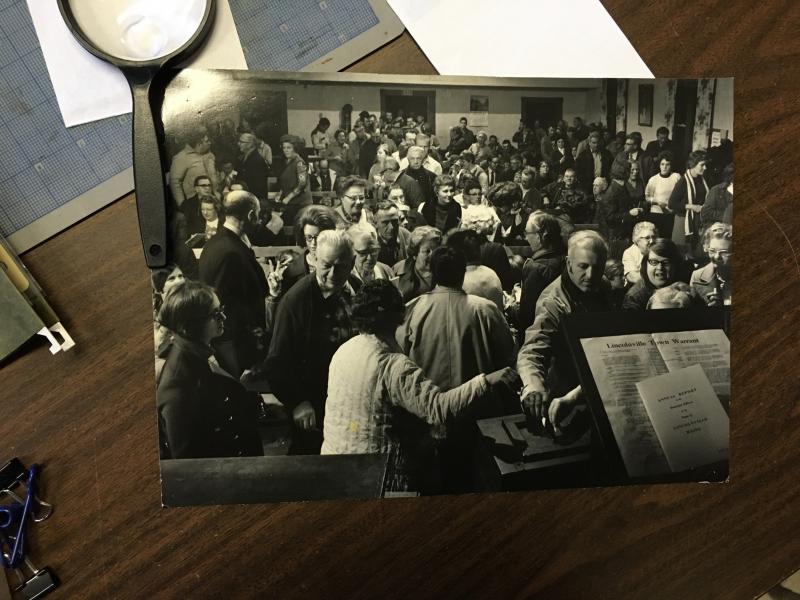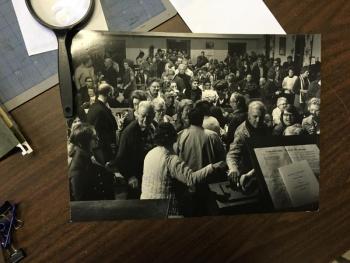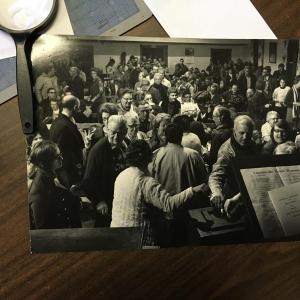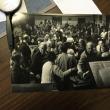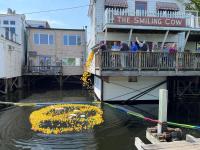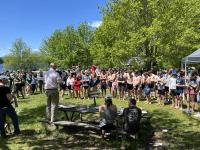This Week in Lincolnville: It’s the Last Thing I Wanted
I’m not gonna lie – we had a sweet deal. For a few hundred dollars a year ($200 in the beginning, $1,000 at the end to help cover the cost of heating oil) the Lincolnville Historical Society (LHS) occupied the original classroom of a 19th century one-room school. It had been vacant for years, probably since the last class moved out in 1947 for the luxury of a four-room school in the Center, consolidating the remaining five one-room schools under one roof. One of its best features? It came complete with flush toilets.
A group of Beach residents began meeting in the downstairs of the empty building, eventually becoming the Lincolnville Improvement Association (LIA) in the late 1940s/early 50s. In about 1990 the LHS moved into the upstairs classroom.
The rent the LHS paid went to the downstairs tenants, the LIA who were occupying their half of the building rent-free. Actually, “rent-free” isn’t actually accurate. In exchange for the building the LIA had been maintaining, repairing and improving the building at their own expense right along.
CALENDAR
MONDAY, Jan. 17
Martin Luther King Day, Town Office and School Closed
TUESDAY, Jan. 18
Library open, 3-6 p.m., 208 Main Street
WEDNESDAY, Jan. 19
Library open, 2-5 p.m., 208 Main Street
Comprehensive Plan Review Committee, 7 p.m., Town Office
THURSDAY, Jan. 20
Conservation Commission, 4 p.m., Town Office
Broadband Committee, 6 p.m., Town Office
FRIDAY, Jan. 21
Library open, 9-noon, 208 Main Street
SATURDAY, Jan.22
Library open, 9-noon, 208 Main Street
EVERY WEEK
AA meetings, Tuesdays & Fridays at noon, Community Building
Lincolnville Community Library, For information call 706-3896.
Schoolhouse Museum by appointment, 505-5101 or 789-5987
Bayshore Baptist Church, Sunday School for all ages, 9:30 a.m., Worship Service at 11 a.m., Atlantic Highway
United Christian Church, Worship Service 9:30 a.m. via Zoom
But who owned the building? Not the LIA, though the town allowed the organization to use the building once it was no longer needed as a school. As the LIA membership got older and less inclined to climb ladders and install furnaces and paint a two-story building, the town began picking up the tab for this basic maintenance. After that it was only a matter of time before a Board of Selectmen would cast their eyes toward the Beach and decide to get rid of a building that was costing them more each year.
Now I’ve been involved in the LHS for some 30 years, and president of it for about 20. There hasn’t been a year in that time that I haven’t offered it to anyone who’d take it. Not the LHS, just the presidency, the leadership, the responsibility. All I’ve really wanted to do is read old stuff – the letters, the journals, the account books and try to turn them all into a narrative about our town. For some reason, no one has ever taken me up on it.
And with Ducktrap: Chronicles of a Maine Village and Staying Put in Lincolnville, Maine 1900-1950, I did just that. Interviewed dozens of people about their lives here, read old records, found journals and photos in the growing archive upstairs at 33 Beach Road. The archive that holds our town’s history.
In the spring of 2020 the town voted to permit the Selectmen to sell the building. In retrospect perhaps it was assumed all along that the LHS would buy it. Who else would want it? But my refrain, going back to when Jackie Watts was president and had dreams that someday we’d have our own building, was “never!”
Never should we own a building. Own a building and taking care of it becomes the primary mission, along with a need for constant fundraising. When would there be time to study those old, leather bound account books from the 1840s, time to assemble the wonderful photographic history we’ve collected into a book, or learn how to digitize and post the voices we have on tape? Or identify and catalog the cellar holes and dams, rock walls and kilns that dot our 39 square miles of town?
No. A building would take up all our energy.
But then, against all my personal expectations for how this would go, people rallied around, pledged to help, and we bought it. For a dollar we bought it.
In the 17 months since the July day at Breezemere when we realized we had support, we’ve not only raised two thirds of our $325,000 goal, we’ve also nearly tripled our memberships, gotten deep into the renovation of the building (steel support beams, refurbished fire escape, reconfigured the downstairs, have an electrical and lighting plan, prepared for new plumbing, begun repair of the west wall), and best of all, assembled a team to work on the archive.
That’s been the surprise. As the years have passed along with most of the people who knew our history personally, I’ve been increasingly on edge. Am I the only one who’s going to remember what all this stuff is? And I’m not even from here.
So gathering a group of people to go through stuff stored in the office that’s just off the old classroom – what we call our Schoolhouse Museum – has been a bonanza. We work in teams with a couple of people going through a family photo album to become familiar with the names and relationships. Another team works their way through the drawers of certificates and diplomas, all securely framed behind glass. These two disassemble them so we can save the paper document, but ditch the frame. We’ll have a frame sale sometime this coming summer.
As we work our way through the boxes and notebooks and piles of paper that make up our collection, we come upon such treasures as the above photo, taken at the 1971 March town meeting at the Grange. As I recall this night, Wally and I were there; it would have been our first town meeting, but I can’t see us in the crush. I’d love to hear who you recognize in the photo. A few jump out at me, and many are familiar, but I can’t put names to most of them.
“I’d like to see more information about Lincolnville’s Indigenous population,” wrote one guy a few months ago, along with his membership renewal. One thing led to another, and we now have an Indigenous People committee. That brought a former LHS board member, Harbour Mitchell, back the other day to go over his Ducktrap artifacts with us.
Some 25-30 years ago Harbour, an archaeologist who’d studied at UMO, was walking the shoreline north of Ducktrap when he spotted a clam shell sticking out of the eroding soil embankment. The only reason clamshell should be in such a place, he explains, is if someone dropped it there when that soil layer was on the surface. In other words, it had been buried under the succeeding layers. And that implies centuries of deposits.
Harbour dug a number of test pits in the area over the next few years, as his time and landowners’ permission allowed, discovering a rich trove of artifacts thousands of years old. Rich that is, if you treasure pieces of animal bone, little pottery sherds (not shards, Harbour says that’s glass), hundreds of stone flakes and the resulting stone tools. All of it points to a long and probably varied occupation of the land north of Ducktrap by Indigenous people, the ancestors of today’s Penobscots.
In the earliest days Islesboro was a hill in the distance with the shoreline beyond that. The site would have been some miles from shore, not the water’s edge it is today. Harbour, who today is deeply involved in historic archaeology, uncovering the routes of old roads, exploring cellar holes in other towns, met with a couple of us to explain his earlier work with the prehistoric Ducktrap artifacts.
Before we were done we’d made a date – April 16th, another Saturday – to hold a training session for a number of volunteers, where Harbour will work with us and his collection, so we’ll have a number of folks who know what all this means. That way, going forward, there’ll be some of us in town who understand the significance of these relics. Join us if you’re interested.
After a morning of handling the sherds of an ancient pot, pressing soft Sculpey clay into the indentations made by fingers eons ago it all seemed worthwhile. Our mornings going through the drawers and notebooks are more than worthwhile. It seems that taking on this building has been good for the lifeblood of the Historical Society.
As always, let me know if you’d like to join in the fun, i.e. volunteer to help us uncover more of our town’s story, and figure out ways to tell today’s story too.
Town Office
Reminder to self: license Fritz today. If you haven’t already made your dogs legal citizens for 2022, do it now online or tomorrow at the Town Office. There’s a February 1st deadline before a state-mandated fee is enacted.
Condolences
Freddy Jackson passed away last week. Reading his obituary brought back memories of Freddy walking his pig along Beach Road. I didn’t know him, but felt like I did after reading about his life. Sending sympathy to his family; it’s a hard time for sure.

